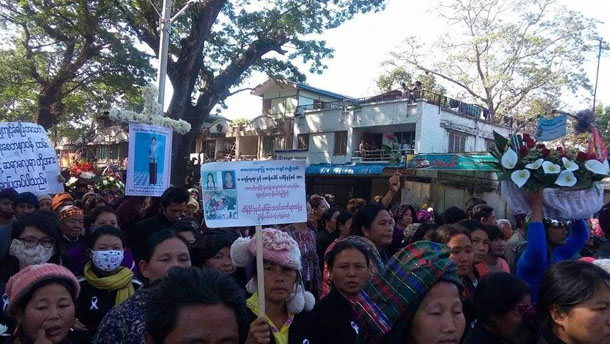The opposition National League for Democracy (NLD) party on Monday implored Burma’s government to swiftly get to the bottom of the grisly murder of two Kachin schoolteachers last week, saying the country’s tenuous peace process could hang in the balance.
“The loss of the two young Kachin schoolteachers—who were passionate, kind and courageous—is not just a loss for the Kachin Baptist Convention, but for the country as well,” the NLD said in a statement on Monday.
The two Kachin teachers—Maram Lu Ra and Tangbau Hkawn Nan Tsin, both 20 years old—were killed on Jan. 19. Their partially clothed bodies were found in their shared dormitory in Kaung Kha village, near the border town of Muse, the next morning. They were buried on Thursday in Myitkyina, the Kachin State capital, after an autopsy was conducted at a hospital in Muse.
“The rumor about the murderers in the gruesome killing could lead to unwanted conflicts while the country is moving forward to a nationwide ceasefire,” read the NLD statement, referring to widespread speculation—not yet confirmed by any official source—that the women were also victims of rape. “Therefore, the government must quickly take action to reveal the truth.”
Like the NLD, a number of both domestic and international advocacy groups have also released statements in recent days purporting to have verified that the women were raped.
On Monday, the Kachin Baptist Convention (KBC) held a prayer vigil for the victims in Kaung Kha village to mark the seventh day since their killing.
A KBC leader said the convention was told by police on Saturday that authorities were investigating the case under Section 302 and Section 376 of Burma’s penal code, covering murder and rape, respectively. Officials have provided no further information on the case, the KBC leader said.
Village head La Sai said the results of the autopsy remain unknown, as investigators continue to question villagers in Kaung Kha.
Locals say the murders coincided with an increased Burma Army troop presence in the area, fueling speculation among residents—and on social media—that a soldier or soldiers were behind the crime.
Police Col. San Lwin, head of the Shan State Police, told The Irrawaddy that the investigation is ongoing. He said hair samples collected from the scene of the crime were being sent to a forensics department in Naypyidaw for DNA testing.
“The pieces of hair were found in the two schoolteachers’ hands,” San Lwin said. “We took the hair samples of 25 soldiers and 10 villagers in front of the Kaung Kha village head and the KBC. They were sent to the Naypyidaw forensics team.”
He added that the Burma Army had taken control of the crime scene and was requiring anyone entering the area first receive permission from the military, hindering investigators.
“The truth will prevail sooner or later. The Army has also helped us in our investigation to question witnesses as well as ensure our security,” San Lwin said.
Presidential spokesman Ye Htut told The Irrawaddy on Monday that the Burma Army was cooperating with investigators to uncover the perpetrators of the crime.
Additional reporting by Nang Seng Nom.

















